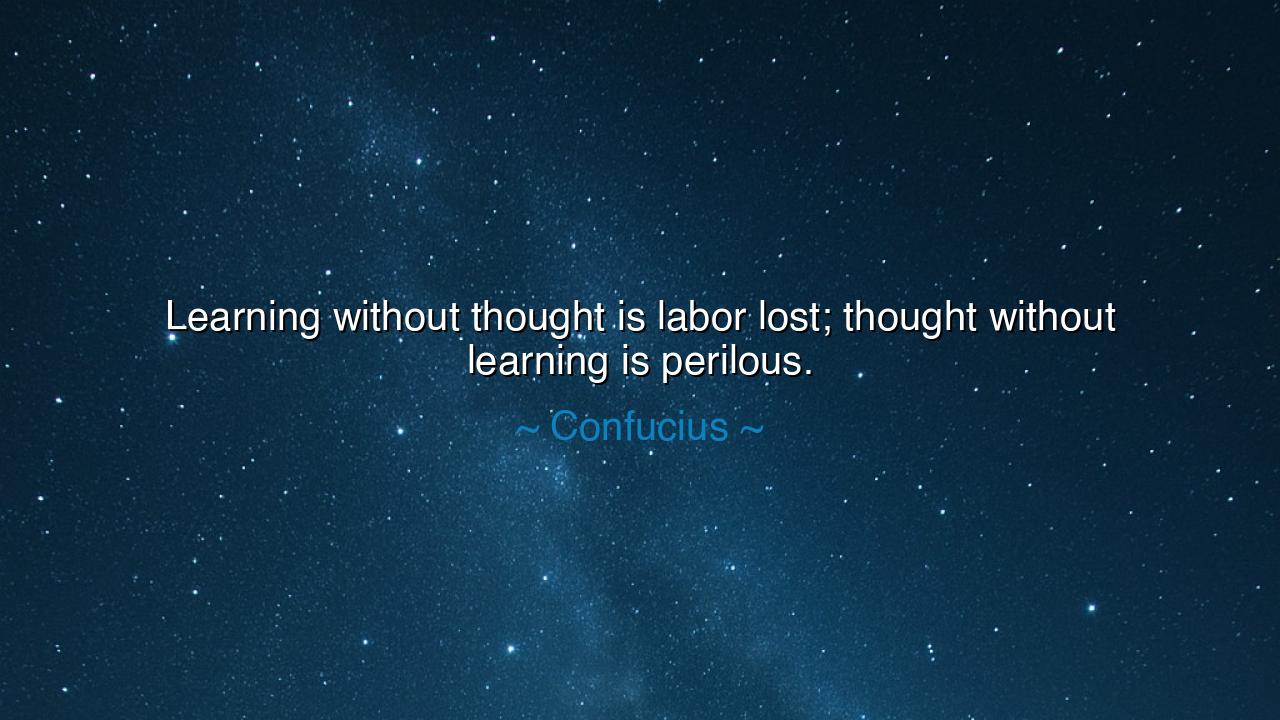
Learning without thought is labor lost; thought without learning






“Learning without thought is labor lost; thought without learning is perilous.” – Confucius
From the dawn of wisdom, the sage Confucius spoke words that have outlived empires and outshone kings. In this teaching, he reveals the eternal balance that must exist between learning and thought — between gathering knowledge and understanding its essence. To learn without thought is to carry water in a sieve; all effort is wasted, for knowledge unexamined flows away. Yet to think without learning is to wander in illusion, crafting castles of imagination unmoored from truth. Between these two errors lies the narrow path of wisdom, the way of balance that Confucius called The Mean — where knowledge feeds reflection, and reflection refines knowledge.
In ancient China, where Confucius walked and taught, the land hungered for order and virtue. Scholars filled their scrolls with words, their tongues with teachings, but their hearts were often hollow. They studied for status, not for truth. Confucius saw this and warned them: knowledge without reflection is vanity disguised as scholarship. To memorize the words of the ancients without seeking their meaning is to mistake the form for the spirit. Learning, he said, must not only fill the mind — it must shape the soul. It is not enough to collect wisdom; one must digest it, question it, and transform it into character.
Yet he did not exalt thought above all else. For he knew that thought without learning is no less dangerous. Imagination unanchored by truth becomes arrogance. It breeds those who believe they are wise though they have never studied, who trust their instincts but not the discipline of inquiry. Such minds become their own deceivers. They act upon falsehoods and mistake opinion for truth. Thus, Confucius warned that thinking without the nourishment of learning is perilous, for it leads not to enlightenment, but to delusion.
There is a story from the later centuries that mirrors this teaching — the story of Emperor Qin Shi Huang, the first unifier of China. Brilliant in ambition, ruthless in thought, he sought immortality not through virtue but through control. In his hunger for power, he burned the books of scholars, believing his own will to be wiser than the wisdom of the past. He surrounded himself not with teachers, but with flatterers. His thoughts without learning led him to folly; he consumed mercury elixirs in pursuit of eternal life — and found only death. Thus the empire he built through force crumbled in a generation, for it lacked the foundation of true wisdom.
On the other hand, history honors those who balance learning and reflection. The sage Zhu Xi, a thousand years after Confucius, taught that learning is like planting a tree and thought is like tending it. Without study, there are no roots; without reflection, there is no fruit. He spent years reading the classics, then meditated upon each word until it took root in his heart. His philosophy shaped China for centuries, guiding scholars to live with clarity, humility, and reason. He proved that true learning is not the gathering of facts, but the harmony of mind and heart.
Confucius’s teaching calls upon us, even now, in an age overflowing with information. The modern world is rich in learning but poor in thought. We scroll through oceans of knowledge yet rarely pause to ask what it means, or how it should change us. We fill our minds but not our spirits. Others, in pride, reject the wisdom of those before them, trusting only their fleeting emotions — and fall into the peril Confucius foresaw. His words ring as a warning across time: to know much and understand little is to waste one’s life; to think deeply yet know nothing is to endanger it.
Therefore, my children, walk the middle path. Learn, but do not learn blindly. Think, but do not think in isolation. Let knowledge be your compass and reflection your map. Read with reverence, question with patience, and let your understanding bear fruit in deeds. When you study, ask: “What does this teach my heart?” When you think, ask: “What truth have I confirmed through learning?” Thus will your labor never be lost, and your thoughts never be perilous.
For the wise live not by knowledge alone, nor by thought alone — but by the sacred union of both. In this harmony lies the strength of the scholar, the peace of the sage, and the immortality of the spirit. Learning and thought are the twin wings of wisdom — without either, the soul cannot fly.






AAdministratorAdministrator
Welcome, honored guests. Please leave a comment, we will respond soon